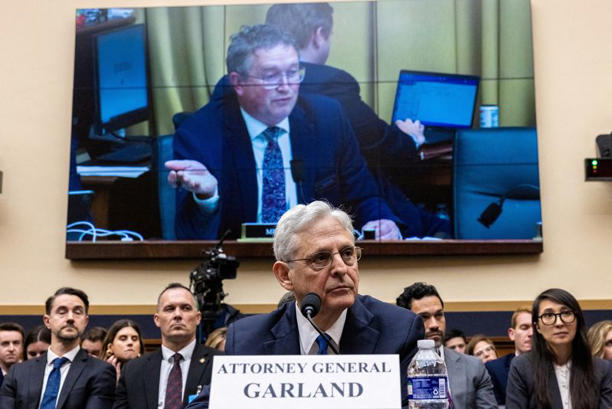The Republican-controlled U.S. House of Representatives recently voted to hold Attorney General Merrick Garland in contempt. This action was taken because Garland refused to turn over audio recordings of a special counsel interview with President Joe Biden. The vote passed narrowly, with a 216-207 margin, indicating a party-line division with one Republican joining the Democrats in opposition.
This event is significant for several reasons:
- Historical Context: Garland is at risk of becoming the third attorney general in U.S. history to be held in contempt of Congress, following Eric Holder and Bill Barr.
- Executive Privilege: The White House has claimed that the recordings are covered by executive privilege, complicating the matter as the House seeks to enforce its subpoena.
- Political Implications: The contempt vote is seen by some as a partisan move, potentially aimed at gathering material for campaign ads against Biden.
- Legal Precedents: Historically, the Justice Department has not pursued charges against officials who have been held in contempt when they were asserting executive privilege.
Analyzing this situation, it reflects the ongoing tension between the legislative and executive branches, particularly when different parties control them. It also underscores the challenges of balancing congressional oversight with the confidentiality of executive communications. The outcome of this vote and its repercussions could have lasting implications on the relationship between these branches of government and the precedent it sets for future interactions.
Contempt Vote Implications
The implications of the House vote to hold Attorney General Merrick Garland in contempt are multifaceted and could have several consequences:
- Legal and Constitutional Implications:
- Political Ramifications:
- The vote is indicative of the current political climate and the extent of partisan divisions within the U.S. government.
- It may be used as a political tool in future campaigns, potentially influencing public opinion and voter behavior.
- Impact on the Justice Department:
- Public Perception:
- Future Congressional Actions:
The vote to hold AG Garland in contempt has implications that extend beyond the immediate legal context, potentially affecting political dynamics, the functioning of the Justice Department, public perception, and future legislative actions. It underscores the complex interplay between different branches of government and the ongoing debate over the scope of their respective powers.
Previous contempt cases in Congress have been resolved through a variety of outcomes, often depending on the political context and legal arguments involved. Here’s a general overview of how such cases have been handled:
- Criminal Contempt:
- If the House passes a criminal contempt resolution, it is referred to federal prosecutors, usually the U.S. Attorney’s office in D.C. The Department of Justice (DOJ) then decides whether to bring those charges before a grand jury.
- Civil Contempt:
- Congress can also file a lawsuit in federal court seeking a judge’s order to compel compliance. This process can be lengthy and may involve appeals.
- Inherent Contempt Powers:
- Congress has the authority to detain and imprison an individual until they comply with a subpoena, but this power has not been used in modern times.
- Resolution through Negotiation:
- Often, contempt cases are resolved through negotiations between the involved parties, resulting in a compromise or agreement that avoids further legal action.
- Dismissal or Non-Prosecution:
- Judicial Rulings:
- Courts can rule on the validity of the contempt citation and the extent of executive privilege, which can either uphold or dismiss the contempt charges.
The resolution of contempt cases can be complex and is influenced by the interplay of legal, political, and constitutional factors. Each case is unique and can set precedents for future interactions between Congress and individuals or entities subject to its subpoenas.
AG Merrick Garland Contempt Vote: Recourse
After the House vote to hold Attorney General Merrick Garland in contempt, there are several legal recourses available:
- Judicial Review: The Attorney General can seek judicial review of the contempt citation, challenging its validity or the legal basis for the subpoena.
- Negotiation: The Attorney General can engage in negotiations with Congress to reach a compromise that might involve providing some of the requested information or finding an alternative solution.
- Asserting Executive Privilege: If not already done, the Attorney General can formally assert executive privilege, which may provide a legal basis for refusing to comply with the subpoena.
- Filing a Lawsuit: The Attorney General can file a civil lawsuit against the enforcement of the subpoena, which would be decided by the federal courts.
- Compliance: Alternatively, the Attorney General could choose to comply with the subpoena and provide the requested information, thereby resolving the contempt citation.
It’s important to note that these actions can be complex and may involve protracted legal battles. The outcome would depend on the specifics of the case, including the legal arguments made and the current judicial interpretations of the law.
A.I.rwaves Perspective on Ethical AI Contributions
Artificial Intelligence (AI) can significantly contribute to public transparency and official accountability in the following ways:
- Enhanced Decision-Making:
- Transparency in Public Affairs:
- Accountability and Responsibility:
- Auditing and Compliance:
- Public Engagement:
- Predictive Analysis:
- Ethical Standards:
- Education and Awareness:
- Crisis Management:
- Resource Optimization:
By integrating AI into public administration, governments can enhance their transparency and accountability, leading to a more informed and engaged public, better decision-making, and ultimately, a more trustworthy government.






Leave a comment